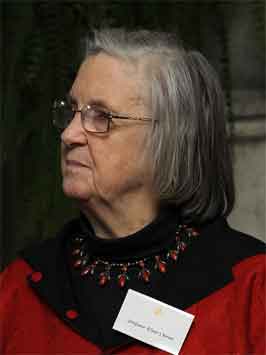| Profile | Major Works | Resources |
Elinor Ostrom, 1933-2012.
Elinor Ostrom was a political scientist in the Public Choice tradition of New Institutional economics.
Born Elinor Clair Awan and raised in relatively difficult circumstances in Los Angeles, California. She enrolled at UCLA and obtained her BA in 1954. She met her first husband Charles Stewart in college, and accompanied him to Boston after graduation, where he was attended Harvard Law. They returned to Los Angeles, where Stewart began a corporate law career. Dissatisfied as a lawyer's wife, Elinor decide to pursue graduate studies. Discouraged from pursuing advanced degree in economics, she instead studied political science at UCLA, receiving her Ph.D. in 1965, with a dissertation on water resource management.
Elinor divorced her first husband and married fellow political scientist Vincent Ostrom in 1963. When Vincent got an academic job at Indiana University in Bloomington, she moved with him and managed to obtain a job as a lecturer in the political science department. Her early work was primarily on policing. Both Vincent and Elinor Ostrom where greatly influenced by the appearance of James Buchanan & Gordon Tullock's Calculus of Consent (1962), and embraced the "Public Choice" perspective of grounding institutions in individual behavior. The Ostroms went beyond them in trying to explain how institutions develop from the bottom-up and evolve, and the important role of self-government contributes to the efficiency of their design. An important article by Vincent Ostrom, Charles Tiebout, and Robert Warren (1961) on local municipal government set the foundations of the "Bloomington view" that decentralized, small organizations work better than larger, centralized ones. The Ostroms would become the main propagators of the "Bloomington view", emphasizing the benefits of "polycentricity" (decentralized but cooperative institutions, a term first used by Michael Polanyi in 1951) over centralized institutions.
Elinor Ostrom took the theoretical attachment to polycentricity to empirical field work in the 1970s. The Ostroms established the Workshop on Political Theory and Policy Analysis (now the "Ostrom Workshop") at Indiana University in 1973 to study applications of local governance. She was finally appointed professor of political science at Indiana in 1974.
Particularly intriguing was the question of governance of common pool resources (e.g. open pastures, forests, fisheries, water supplies). The conventional approach in economics at the time was primarily influenced by Garrett Hardin's (1968) paper on the "Tragedy of the Commons" (borrowing the phrase from W.F. Loyd, 1833) which characterized common pool resources as finite, and likely to be over-exploited by individuals pursuing their self-interest without regard for the usage needs by others, which meant the commons would be eventually depleted and destroyed. This was regarded by Hardin (and most mainstream economists) as a case of market failure. Hardin suggested that to prevent exhaustion, common resources needed to be managed by an external centralized authority, like a government, to take control, monitor behavior and and impose sanctions for over-utilization. New Institutionalist economists, applying the Coase theorem, suggested that the problem could be "solved" by an external government assigning formal private property rights to the commons.
Elinor Ostrom took the question up and investigated how common pool resources are actually managed in practice. She conducted field work on local management of various commons (e.g. pastures, forests, fisheries, irrigation systems) in various locations (Japan, India, Nepal, Sri Lanka, Canada, Spain, Philippines, etc.). She discovered that in fact, contrary to Hardin's expectations, many local communities had learned to self-organize and collectively manage common resources in a sustainable manner. Communities develop norms and rules, which are respected by the users of the resource. Neither the artifact of formal property ownership nor an external central power were required to enforce it. Communities had learned on their own to develop institutions of governance to escape the tragedy of the commons.
Ostrom's principal work, Governing the Commons (1990), reported her main findings. Not all of her field examples of local governance were successful, but those that were had several similar features. Ostrom's identified several design principles which make for successful local governance. Ostrom's approach is sometimes called the "Institutional analysis and development framework" (IAD). It has become influential in economic development.
Ostrom's work demonstrated more generally that there are cooperative solutions to collective action problems. She showed how institutions - that is rules and norms - can develop endogeneously and lead to cooperative outcomes.
Elinor Ostrom won the Nobel Memorial prize in 2009 "for her analysis of economic governance, especially the commons". She shared the prize with Oliver E. Williamson.
|
Major Works of Elinor Ostrom
|
|
HET
|
|
Resources on Elinor Ostrom
|
All rights reserved, GonÁalo L. Fonseca

